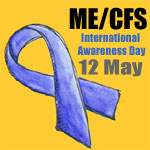 Today is ME/CFS Awareness Day. Last year, we marked the occasion by uploading a song called "Everybody Knows About Me" to our Myspace page. I wrote it from the perspective of someone suffering from undiagnosed ME/CFS, though it could just as easily apply to other chronic immunological and neurological disorders such as fibromyalgia, MCS/environmental injury, or chronic lyme disease.
Today is ME/CFS Awareness Day. Last year, we marked the occasion by uploading a song called "Everybody Knows About Me" to our Myspace page. I wrote it from the perspective of someone suffering from undiagnosed ME/CFS, though it could just as easily apply to other chronic immunological and neurological disorders such as fibromyalgia, MCS/environmental injury, or chronic lyme disease.Since then, we've made an updated version of "Everybody Knows About Me" available for download. You can get the song here for free, though a donation to the ME/CFS advocacy site that hosts it is encouraged.
You may be thinking, "What is ME/CFS, and why should I be aware of it?" I'll answer that question and others in a handy FAQ format. Much of this information is the same as in last year's post, but I've included a few updates.
What's ME/CFS?
The "ME" part stands for myalgic encephalomyelitis. The "CFS" part stands for chronic fatigue syndrome.
Oh, chronic fatigue syndrome! Yeah, I've heard of that. I don't get what the big deal is, though. I get tired too.
ME/CFS isn't just being tired. Symptoms vary from person to person, but commonly include:
- chronic, debilitating pain
- post-exertional malaise -- symptoms get worse after physical or mental exertion and require an extended recovery period
- flu-like symptoms, such as joint and muscle pain
- cognitive impairment, including problems with short-term memory
- crushing fatigue, which is not relieved by rest
- Other common symptoms include cardiac arrhythmias, chemical sensitivities, food sensitivities, blurry vision, eye pain, irritable bowel syndrome, and a host of other conditions that are nasty in their own right.
Probably not. It's typical for sufferers to have good days and bad days (though a "good day" can still be pretty bad from a healthy person's perspective). If you see someone with ME/CFS out and about, you've probably caught them on a good day. You don't see them lying flat on their back for the rest of the week, in the privacy of their own home, recovering from their trip to the grocery store.
Is there a cure?
No.
Any hope for a cure sometime soon?
Hard to say. Researchers have been making some progress, but this disease gets very little funding. And despite the considerable evidence that ME/CFS is biological in origin, much of the funding it does get goes toward questionable psychiatric research.
That's messed up. I wish there were some way I could help.
You can help in more ways than you know. Here are a few ideas:
- Give to an organization whose primary purpose is finding a cure for ME/CFS. Both the Whittemore Peterson Institute for Neuro-Immune Disease and IACFS/ME take donations.
- Write your congressman.
- If you have a friend with ME/CFS, make an effort to keep in touch. Your friend may not have the energy to call you, but he or she would probably love to hear from you.
- If someone you know makes a comment about how chronic fatigue syndrome is just laziness, don't let it pass. Explain that ME/CFS involves serious pain and real impairment, not just greater-than-average tiredness.
- Send "Everybody Knows About Me" to anyone who might benefit. That includes people who suffer from it and people who don't understand it. Again, you can download the song here. Once you've obtained it, make as many copies as you like and send it to as many people as you like.
* * *
Update: Astute readers may have noticed that when I said "today" was ME/CFS Awareness Day, I got the day wrong. It's May 12, not May 11. Could've sworn I posted this after midnight, on the 12th. Oh well ...
